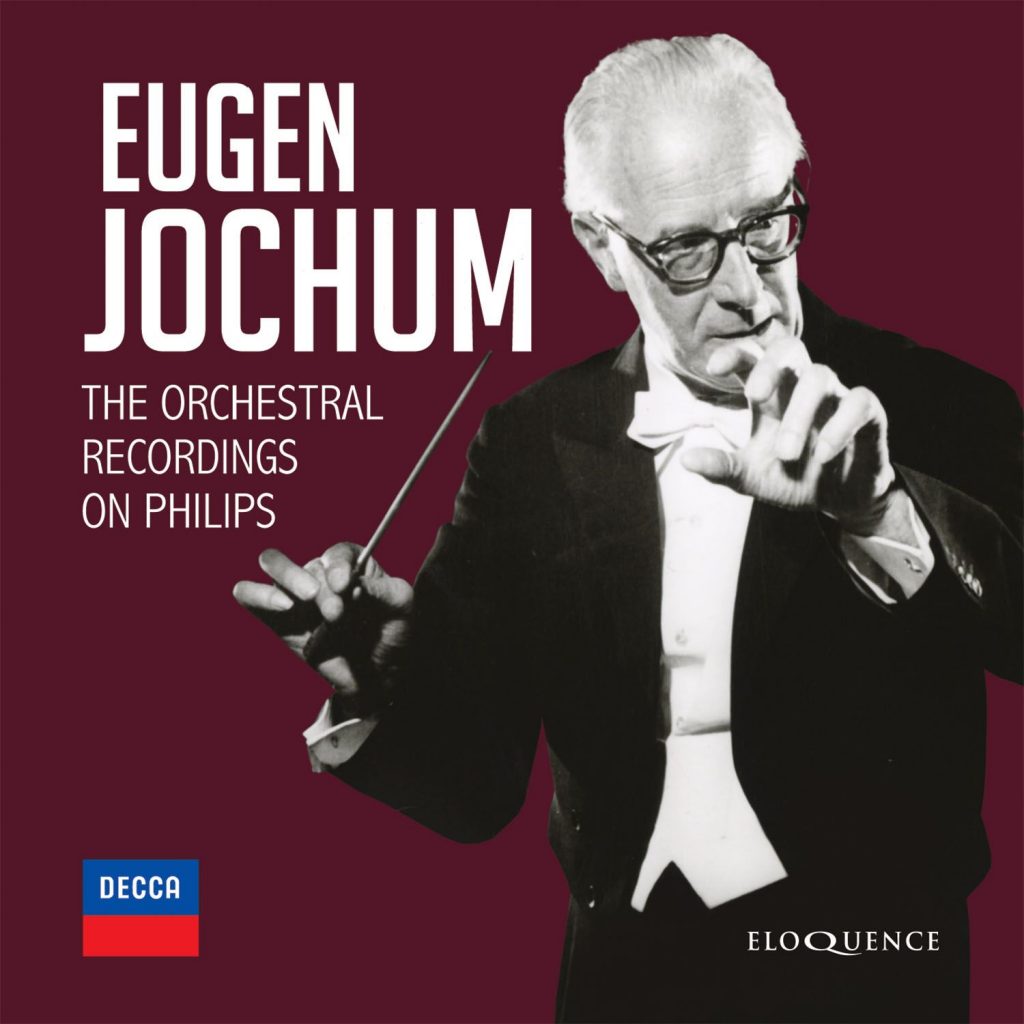According to one former violist in the Concertgebouw Orchestra, Eugen Jochum was the type of conductor ‘who doesn’t “put on” spectacular performances, but whose music-making always bears the stamp of honesty. He is enthusiastic during a concert and also conveys his intentions to the orchestra without any affectation’.
The sincerity and integrity of Jochum’s musical character is conveyed with a unique sweep across his mastery of Austro-German repertoire – operatic as well as symphonic music – in this new Eloquence Classics box set dedicated to his recordings for the Dutch Philips label. The first five discs present the second of the conductor’s complete cycles of Beethoven symphonies, made in the late 1960s. In its plain-spoken but beautifully recorded and played way, this Amsterdam cycle stands the test of time against his earlier Berlin and later London cycles, not least thanks to the particularly harmonious relationship cultivated by Jochum with the great Dutch ensemble (he shared the chief conductorship with Bernard Haitink for three years).
These Philips recordings continue with more Beethoven, a collection of overtures, several receiving their first international release on CD, and a Fifth Symphony from Berlin in 1951. Other notable rarities are saved for the last disc: a solo-vocal Magnificat by Rudolf Mengelberg (cousin of the conductor Willem), recorded in Jochum’s first studio sessions with the Concertgebouw in 1952, and a short sequence of organ works played by Adalbert Meier. This formed Side 4 of the original release of Bruckner’s Fifth Symphony, recorded live at the Rococo splendour of the basilica attached to the Benedictine monastery of Ottobeuren in Bavaria, which was celebrating the 1200th anniversary of its foundation in 1964 when the Concertgebouw gave a performance there unique even in Jochum’s distinguished Bruckner discography for its radiance as well as its unerring sense of pulse.
At the centre of the new Eloquence box, Jochum’s often-underrated way with Wagner and Strauss is well represented by his Philips recordings of overtures and tone-poems (including two versions each of Don Juan and Till Eulenspiegel, from 1952 and stereo remakes from 1960). There are four grand and splendid accounts of late Mozart symphonies, as well as a pair of piano concertos – by Beethoven and Mozart – recorded with the Bamberg SO and his daughter Veronica, who also contributes to Niek Nelissen’s fascinating note for this unrivalled collection of her father’s work.
CD 1
LUDWIG VAN BEETHOVEN (1770–1827)
1–4 Symphony No. 1 in C major, Op. 21
5–8 Symphony No. 2 in D major, Op. 36
Concertgebouworkest
CD 2
LUDWIG VAN BEETHOVEN (1770–1827)
1–4 Symphony No. 3 in E flat major, Op. 55 ‘Eroica’
5–8 Symphony No. 8 in F major, Op. 93
Concertgebouworkest
CD 3
LUDWIG VAN BEETHOVEN (1770–1827)
1–4 Symphony No. 4 in B flat major, Op. 60
5–8 Symphony No. 7 in A major, Op. 92
Concertgebouworkest
CD 4
LUDWIG VAN BEETHOVEN (1770–1827)
1–4 Symphony No. 5 in C minor, Op. 67
5–9 Symphony No. 6 in F major, Op. 68 ‘Pastoral’
Concertgebouworkest
CD 5
LUDWIG VAN BEETHOVEN (1770–1827)
1–5 Symphony No. 9 in D minor, Op. 125 ‘Choral’
Liselotte Rebmann, soprano
Anna Reynolds, mezzo-soprano
Anton de Ridder, tenor
Gerd Feldhoff, bass
Netherlands Radio Chorus
Concertgebouworkest
CD 6
LUDWIG VAN BEETHOVEN (1770–1827)
Overtures
1 Leonore No. 1, Op. 138
2 Leonore No. 2, Op. 72a
3 Leonore No. 3, Op. 72b (1960 recording)*
4 Die Weihe des Hauses, Op. 124*
5 Egmont, Op. 84*
6 Zur Namensfeier, Op. 115*
7 Coriolan, Op. 62*
Concertgebouworkest
*FIRST INTERNATIONAL CD RELEASE ON DECCA
CD 7
LUDWIG VAN BEETHOVEN (1770–1827)
1 Leonore No. 3, Op. 72b (1969 recording)
2 Fidelio, Op. 72c
Concertgebouworkest
3–5 Piano Concerto No. 1 in C major, Op. 15*
WOLFGANG AMADEUS MOZART (1756–1791)
6–8 Piano Concerto No. 14 in E flat major, KV 449*
Veronica Jochum von Moltke, piano
Bamberger Symphoniker
*FIRST INTERNATIONAL CD RELEASE ON DECCA
CD 8
WOLFGANG AMADEUS MOZART (1756–1791)
1–4 Symphony No. 36 in C major, KV 425 ‘Linz’
5–7 Symphony No. 38 in D major, KV 504 ‘Prague’
Concertgebouworkest
CD 9
WOLFGANG AMADEUS MOZART (1756–1791)
1–4 Symphony No. 35 in D major, KV 385 ‘Haffner’
5–8 Symphony No. 41 in C major, KV 551 ‘Jupiter’
Concertgebouworkest
CD 10
FRANZ SCHUBERT (1797–1828)
1–4 Symphony No. 4 in C minor, D. 417 ‘Tragic’*
ROBERT SCHUMANN (1810–1856)
5–8 Symphony No. 4 in D minor, Op. 120*
Concertgebouworkest
*FIRST INTERNATIONAL CD RELEASE ON DECCA
CD 11
FRANZ SCHUBERT (1797–1828)
1–2 Symphony No. 8 in B minor, D.759 ‘Unfinished’*
Concertgebouworkest
LUDWIG VAN BEETHOVEN (1770–1827)
3–6 Symphony No. 5 in C minor, Op. 67*
Berliner Philharmoniker
*FIRST INTERNATIONAL CD RELEASE ON DECCA
CD 12
RICHARD STRAUSS (1864–1949)
1 Don Juan, Op. 20 (1952 recording)
2 Till Eulenspiegels lustige Streiche, Op. 28 (1952 recording)
3–4 Der Rosenkavalier, Op. 59 – Suite of Waltzes
5 Don Juan, Op. 20 (1960 recording)
6 Till Eulenspiegels lustige Streiche, Op. 28 (1960 recording)
Concertgebouworkest
CD 13
RICHARD WAGNER (1813–1883)
1 Der fliegende Holländer: Overture*
2 Tristan und Isolde: Prelude and Liebestod*
Die Meistersinger von Nürnberg
3 Prelude to Act I*
4 Prelude to Act III*
5 Tannhäuser: Overture*
Symphonieorchester des Bayerischen Rundfunks
*FIRST INTERNATIONAL CD RELEASE ON DECCA
CD 14
ANTON BRUCKNER (1824–1896)
1–4 Symphony No. 5 in B flat major
Concertgebouworkest
LIVE RECORDING
CD 15
Organ Music recorded in the Basilica of the Benedictine Abbey of Ottobeuren
NICOLAUS BRUHNS (1665–1697)
1 Praeludium No. 3 in E minor*
LOUIS-CLAUDE DAQUIN (1694–1772)
2 Noël No. 10 in G major ‘Grand jeu et Duo’*
JOHANN SEBASTIAN BACH (1685–1750)
3–4 Prelude and Fugue in G major, BWV 541*
Adalbert Meier
At the Organs of the Benedictine Abbey of Ottobeuren
LIVE RECORDINGS
RUDOLF MENGELBERG (1892–1959)
5 Magnificat°
Annie Woud, alto
Concertgebouworkest
EUGEN JOCHUM
*FIRST CD RELEASE ON DECCA
°FIRST INTERNATIONAL CD RELEASE ON DECCA

